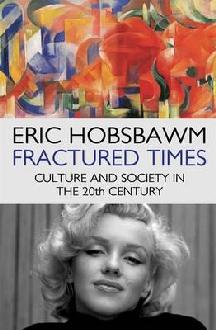Eric Hobsbawm was the preeminent historian in the English language until his death last 1 October. His last work, is soon to be published.

For me Interesting Times, published by Little Brown in 2002 was an introduction to contemporary history that I had never really looked at in terms of changing culture rather than changing society. Fractured Times, if the reviews are anything to go by, is going to be a fantastic read.
To save me the bother of trying to sum up various reviews, I have pinched Amazon's blurb:
'Born at the turn of the 20th century and raised in Vienna, Eric Hobsbawm, who was to become one of the most brilliant and original historians of our age, was uniquely placed to observe an era of titanic social and artistic change. As the century progressed the forces of Communism and Dadaism, Ibiza and cyberspace, would do battle with the bourgeois high culture fin-de-siècle Vienna represented - the opera, the Burgtheater, the museums of art and science, City Hall. InFractured Times Hobsbawm unpicks a century of cultural fragmentation and dissolution with characteristic verve and vigour.
Hobsbawm examines the conditions that created the great cultural flowering of the belle époque and held the seeds of its disintegration, from paternalistic capitalism to globalisation and the arrival of a mass consumer society. Passionate but never sentimental, Hobsbawm ranges freely across his subject: he records the passing of the golden age of the 'free intellectual' and examines the lives of great, forgotten men; he analyses the relation between art and totalitarianism and dissects cultural phenomena as diverse as surrealism, women's emancipation and the American cowboy myth.
Written with consummate imagination and skill, Fractured Times is the last book from one of our greatest modern-day thinkers.'
At the normal price of £25 it is a bit of a big investment, the Guardian is offering it at pre-publication price £18 and it is released on 28 March. Mind you, wait a few weeks and Amazon will no doubt match the £18 and perhaps a little less. I believe it will be a brilliant read whatever.